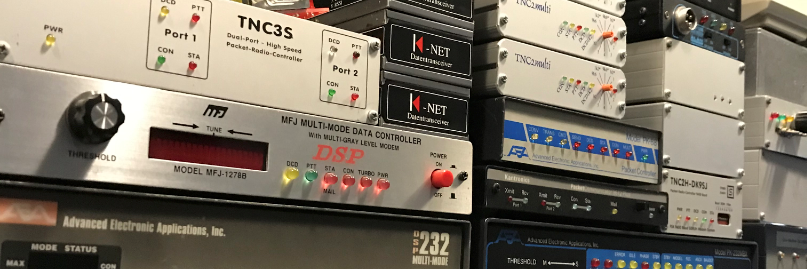
Software is available on this link
Wow, found great software. Yes I know, it has been around for a while. I thought it would be nice to keep me busy on a rainy Saturday. So let’s interface it with LinFBB.
It actually works a bit like BPQ32 and LinFBB with WA8DED emulation. But for XRouter and LinFBB we need a virtual comport. We can make these easily with socat.
sudo apt install socat
Now lets create some comports
# Create pty pair socat -d -d -ly PTY,link=/home/pi/xrpi/ttyq1 PTY,link=/home/pi/xrpi/ptyq1 & sleep 2
I have chosen to create this as a normal user and put it in the directory /home/pi/xrpi/. Now as a normal user I can access and use them. I am never much of a fan of doing everything as a Root user.
Now lets configure XRouter.
INTERFACE=5 TYPE=ASYNC COM=/home/pi/xrpi/ttyq1 PROTOCOL=DEDHOST APPLNUM=1 CHANNELS=4 SPEED=57600 FLOW=0 MTU=256 ENDINTERFACE APPL=1 APPLNAME=FBB APPLCALL=PI8LAP-1 APPLALIAS=LAPFBB APPLQUAL=254 APPLFLAGS=4 ENDAPPL
Next is LinFBB… port.sys
# FBB7.0.8-beta8 # #Ports TNCs 1 1 # #Com Interface Adress (Hex) Baud 1 9 /home/pi/xrpi/ptyq1 57600 #TNC NbCh Com MultCh Pacln Maxfr NbFwd MxBloc M/P-Fwd Mode Freq 0 0 0 0 0 0 0 0 00/01 ---- File-fwd. 1 4 1 1 236 4 1 10 00/15 DUWYL XRpi
Now fist create a start file for XRpi
# First kill running process of socat
sudo kill $(ps aux | grep '[s]ocat' | awk '{print $2}')
# Create pty pair
socat -d -d -ly PTY,link=/home/pi/xrpi/ttyq1 PTY,link=/home/pi/xrpi/ptyq1 &
sleep 2
# Start XRpi(1)
sudo setcap cap_net_raw,cap_net_bind_service=pe xrpi
./xrpi
1. As Normal user, it will need CAP_NET_RAW capability in order to use TCP/IP via the LAN, WiFi or localhost. And it will need CAP_NET_BIND_SERVICE if you wish to open any “service ports” on the linux TCP/IP stack whose numbers are below 1024.
First we have to start XRpi because of course the virtual comports have to be created. After this it is LinFBB’s turn. Now is the time to test.

The link with BPQ32 is also online. Also with virtual comports.

And yes, there is the old trusted LinFBB.
The possibilities are endless with this software. So there goes me free Saturday again.

 Released version 7.0.10 of Linfbb. Great news……
Released version 7.0.10 of Linfbb. Great news……